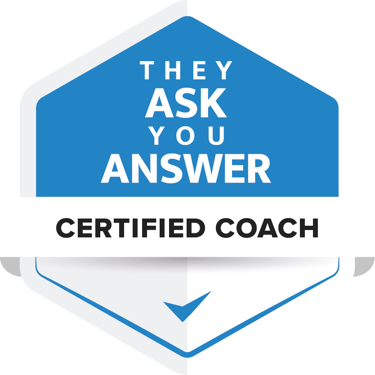Business blogging: 5 blog topics that drive traffic and sales (+ examples)

Whether you call it content marketing, inbound marketing, or business blogging, the challenge for many businesses remains the same: what to write about?
Valuable content can help your business grow, but there is also a lot of low-quality content being published these days, especially since the advance of AI.
This "fluffy" content may provide a (temporary) boost to your website traffic, making it seem like you have a successful blog, but this content will not bring you any additional sales.
So what are the right topics to write about? If you've read Marcus Sheridan's book They Ask, You Answer or have browsed around this site, then you know that we recommend publishing relevant content on your business blog that answers every question your customers ask - even if it makes you uncomfortable.
(Or rather, especially if it makes you uncomfortable.)
If you do this with regularity and consistency, you will quickly be seen as the authority in your industry.
But how do you determine which questions to answer (first) in your content so that you see the fastest results?
This is the question Marcus also asked himself, after spending some time following the principles of They Ask, You Answer for his own company, River Pools and Spas, and for hundreds of others.
He dove into the data to see if he could spot patterns and trends.
Specifically, he wondered if there was a direct correlation between published content and website traffic, leads and sales - the three most important metrics for any company with a digital sales and marketing strategy.
He found that five specific blog categories - which we now call the Big 5 - consistently outperformed any other blog topic, regardless of the industry in which the company operated.
In this article:
The Big 5: blog topics that work for any industry
According to Google, 53% of shoppers say they always do research before making a purchase to ensure they are making the best possible choice. The Big 5 blog topics align perfectly with this.
They are:
Below we take a closer look at these Big 5 blog topics and give examples of blog posts in which they are well developed.
1. Costs and Prices
When people make a large investment, they naturally want to know approximately what they will lose. Preferably before they even talk to a sales representative.
By communicating openly and transparently about costs and prices on your business blog, you gain the trust of your prospects and can help them make an informed buying decision.
What if you don't list your prices? Maybe you think the potential customer will contact you. But he doesn't, he goes to the competitor who does list his prices.
Objections to listing prices
We hear in practice that companies may have three different objections to listing prices on their websites:
Are these objections recognizable to you?
Then read on.
"Our products are custom-made."
We understand, every project you do is different. There are many factors that affect the final cost, so prices can vary.
But your buyers surely understand that. You don't have to give them an exact price. Write on your business blog about the factors that affect price and at least give a price range. It's that simple.
"Then our competitors also know what the prices are."
Do you know what your competitors' prices are? You probably have at least an idea. So why do you think they don't also have at least an idea of your prices?
Take a look at their website. Do they talk about costs? If so, you better catch up before your buyers go to the competition. If not, here's your chance to get ahead of them.
"Then we might scare off prospects before we can explain the cost to them."
Leads who can't afford your product can't even afford it after a sales call. So if these leads drop out thanks to the content on your business blog before you get into a conversation, you haven't lost anything. You've only saved yourself time by not engaging with a lead who was never going to become a customer anyway.
Being clear about your costs helps people qualify or disqualify themselves early on.
And even if they can pay you, this honesty also creates trust. You didn't try to hide things, but let them know exactly what to expect. People want to do business with companies they can trust.
Examples of cost items
'Problems' content 2.
Something else you should be honest about in your content are possible shortcomings or "problems" with your product.
Because tell me honestly: have you ever Googled the benefits of a product you were considering purchasing? Probably not. Much more likely, you've searched for problems and disadvantages. Your customer does, too.
So be honest about potential problems with your product, service or industry, but don't forget to mention solutions as well.
An additional advantage: you filter out customers who are likely to be dissatisfied with your product and only attract customers who are not deterred by the drawbacks.
Few companies have the courage to write transparently about the drawbacks of their products. If you do dare, you will have unique content and chances are you will have very little competition in the search engines.
Examples problems-articles
3. Equations
Around the time they research problems and drawbacks, most people also want to compare products or services.
What product or service is best for their situation?
Be as honest as possible in your review. And at the beginning of your blog, let your readers know what you are selling. They need to know if you have an interest in selling a particular product. If that is indeed the case and they find out later, you have lost their trust.
Examples comparisons-articles
'Best' reviews 4.
When you were researching your last big purchase, did you use words like "best" in your search? You probably did. It's one of the most common ways people search.
We want to put all our options on a spectrum from worst to best until we find the option that is best for us.
'Best' topics you should cover
Best competitors
Suppose you're an ecological insulator, so you specialize in biobased insulation. How do you think people will search for a company that does biobased insulation? They will probably use search terms like "best biobased insulation company" or "best ecological insulator."
Perhaps you are afraid that your customers will go to a competitor the moment you write a blog about your best competitors.
You may be thinking: why should I make my clients wiser than they are?
But let's face it: they will find out who your competitors are anyway.
Moreover, writing about your competitors has some unexpected benefits:
Best in its category
If you're a wholesale, retail or SaaS company, you can go all out in writing "best" articles.
Suppose you sell camping equipment. Whether you are a local business or have a web shop, you can write "best" items for each product line until you are old and gray.
And in doing so, you can go as far as you want:
But don't get stuck in "best," you can also use all kinds of variations:
Best way(s) to...
Do you have useful advice for users of products or services you sell? How can people get the most out of this?
We'll continue on the example of camping equipment for a moment. People researching this probably also want to know things like:
In each of these blogs, you can include links to products you sell.
Are you going camping? Then you'll need a tent (add links to your tents).
Are you going to make a fire? Then you'll need a fire starter kit (add links to kits)
Going fishing? Then you need fishing rods, boots, filleting knives and so on (add links to these products).
Examples of 'best' articles
5. Reviews by experts and previous customers
Buyers considering making a purchase often want to know what others think about it. As many as 95% of buyers report reading reviews before making a purchase.
If real people are enthusiastic about the purchase, they are also more likely to buy. But if others complain, they may avoid the purchase.
This is where reviews come in. If you can write honest reviews about products you sell (and even products you don't sell), you'll connect with more prospects looking for help in making a purchase.
Examples reviews
Where to start with business blogging according to the Big 5?
Option 1: Start with your ideal buyers' most frequently asked questions
In this scenario, you hold a content brainstorm with your sales team and ask them what questions they get most from your ideal customers.
When you begin this strategy, you usually write for the "bottom of the funnel" first. You then answer questions that show a clear buying intent. This applies, for example, to comparisons and reviews. Someone who compares products and reads reviews is much further along in the sales process than someone who googles "what is ...".
Only when you have exhausted the bottom of the funnel (bofu) and the middle of the funnel (mofu) do you start writing for the top of the funnel (tofu). These are questions from people who are still in the orientation phase. "What is ..." is an example of a tofu topic.
Option 2: Start writing about costs
Option 2 is that you start writing about cost and then 'finish' the rest of the Big 5. "What does it cost?" is a question on everyone's mind, so you want to create new content about that as soon as possible.
You may be tempted to first write about topics that bring a lot of traffic to your website (those tofu topics mentioned above).
Then it's good to know that these topics usually have low buying intent. Lots of people are searching on them, you have lots of competition in the search engines, but these people are not yet ready to buy.
With bofu topics, it's just the opposite. Fewer people search on it, you have much less competition in the search engines, but the people searching on it are waving their wallets.
Bofu content published today can be used to close a deal tomorrow. See if you can get that done with tofu content.
So don't be tempted to write about topics that bring a lot of traffic to your website, but which show a low buying intent. Rather, focus on the topics with a high buying intent. Getting more traffic to your Web site is important, but it's also a long shot.
Related articles
March 25, 2024
-
Reading time: +/- 7 min








